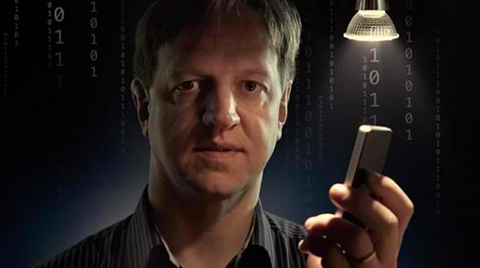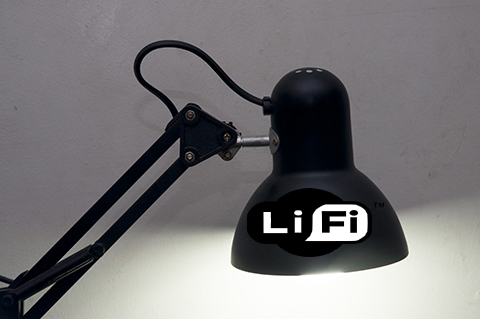Wireless Fidelity, aka Wi-Fi is so 2013, or at least that’s how the engineers behind Light Fidelity (Li-Fi) see the future wireless data transmission. Let’s delve a little deeper into this fairly new concept and see how it can revolutionize the way we connect to the internet.

After working on his project for nearly 8 years, University of Edinburgh’s Professor Harald Haas showcased his idea publicly during a TED talk back in 2011.
His idea involves turning an ordinary LED light bulb in to a wireless broadband device by rigging it to radio microchip. This chip then controls how the LED light behaves; switching it on and off to produce signals similar to binary codes which is then deciphered by a receiver on the other end.
Professor Haas’ idea caught fire and led to a £4.7-million grant from Engineering and Physical Sciences Research Council (EPSRC) to fund his project. He’s now collaborating with a group of talented individuals from various Universities including Cambridge, Edinburgh, Oxford, St Andrews and Strathclyde.
Within the span of a year, Haas and his team has already covered a lot of grounds since they began to work together under the Ultra Parallel Visible Light Communications (UP-VLC) project and has recently made the headlines when they reported that they were able to reach transmission speeds of up to 10 Gbit/s using only single micro-LED light bulb.

Apart from lightning fast speed, another feature of Li-Fi that Haas takes pride on is that it’s “potentially more secured than traditional Wi-Fi connection” because light doesn’t pass through walls. However, this strength can also be its biggest drawback as future users needs to always be within range of the Li-Fi device in order to establish wireless connection.
Li-Fi is still a work in progress, but I think that the team working on the project is headed in the right direction and it’s pretty exciting to see what they’ll come up with in the future.
{source }

YugaTech.com is the largest and longest-running technology site in the Philippines. Originally established in October 2002, the site was transformed into a full-fledged technology platform in 2005.
How to transfer, withdraw money from PayPal to GCash
Prices of Starlink satellite in the Philippines
Install Google GBox to Huawei smartphones
Pag-IBIG MP2 online application
How to check PhilHealth contributions online
How to find your SIM card serial number
Globe, PLDT, Converge, Sky: Unli fiber internet plans compared
10 biggest games in the Google Play Store
LTO periodic medical exam for 10-year licenses
Netflix codes to unlock hidden TV shows, movies
Apple, Asus, Cherry Mobile, Huawei, LG, Nokia, Oppo, Samsung, Sony, Vivo, Xiaomi, Lenovo, Infinix Mobile, Pocophone, Honor, iPhone, OnePlus, Tecno, Realme, HTC, Gionee, Kata, IQ00, Redmi, Razer, CloudFone, Motorola, Panasonic, TCL, Wiko
Best Android smartphones between PHP 20,000 - 25,000
Smartphones under PHP 10,000 in the Philippines
Smartphones under PHP 12K Philippines
Best smartphones for kids under PHP 7,000
Smartphones under PHP 15,000 in the Philippines
Best Android smartphones between PHP 15,000 - 20,000
Smartphones under PHP 20,000 in the Philippines
Most affordable 5G phones in the Philippines under PHP 20K
5G smartphones in the Philippines under PHP 16K
Smartphone pricelist Philippines 2024
Smartphone pricelist Philippines 2023
Smartphone pricelist Philippines 2022
Smartphone pricelist Philippines 2021
Smartphone pricelist Philippines 2020
hemakumar says:
Can i know the range of Li-Fi
ervin says:
Lightning fast wireless connection FTW! \m/^_^
Rex says:
“Wireless Fidelity, aka Wi-Fi is…”
Wi-fi does not stand for wireless fidelity. It is not a shorthand for anything. It is just a play on words to to sound like hi-fi. And a successful one at that.
wew says:
how about using Infrared LEDs kung ayaw ng user ng kahit anong ilaw maliban sa screen.
Analog says:
i love the idea, i imagine gadgets wherein the back covers are full of photo sensors. tsaka d mo mapapansin ang pag on / off ng ilaw sa taas ng switching frequency nya. pag nasa bahay i dont think problema ang range basta may ilaw, at lahat ng ilaw dapat naka-sync. kung may other source ng ilaw na itatapat sa device, medyo challenging yun, pero gaya ng sabi ko, implementing several sensors will do the job to identify which signal is the real one.
eoji says:
“WiFi aint Wireless Fidelity. WiFi is WiFi just as Toyota is Toyota.” So Toyota just came out of nowhere, people thought about things a lot especially when coining something important. When I read this, my mind was revolting in silence, so reading a lot of stuff sometimes confuses us with what we already know, obfuscation is prevalent nowadays.
Shutup says:
Wi-Fi means Wireless Fidelity. Yung hindi nakakaalam nyan ay ipinanganak in the 90’s onwards kung hindi nagresearch. Yung iba, galing galingan lang. Peace!
Talino says:
Oh my pink gosh. Yung mga nagmamarunong hindi alam ang “wireless fidelity” ???? Sila ata ang nagkulang sa research.
Mario says:
hahaha oo nga pang-gulo masyado. napaisip nga rin ako nung nabasa ko yung sinasabi nila i mean wtf man all these years mali pala ang pagkakaintindi ko sa wifi?! akala ko tuloy nabobobo na ko haha.
chill says:
@Jeremy @HiFi
chill lang.. you are both correct.. WiFi is just WiFi… but a decade ago, the Wi-Fi Alliance did refer to WiFi as “Wireless Fidelity”.. they then dropped it quietly for some reason…my guess is, they initially used it for easier marketing considering marami may alam sa “high fidelity = hifi” and then they dropped it when the tech was gaining momentum na… again, hula ko lang to bakit nila drinop…
please see the bottom of pdf page 4 (under “A Short History of WLANs”) from this official doc of the WiFi Alliance back in the day… it clearly states “…WiFi (Wireless Fidelity)…”
http://www.wi-fi.org/files/wp_4_Securing%20Wireless%20Networks_2-6-03.pdf
so chill lang tayo mga sir… :)
Mario says:
i was taught in a class on history of networking in college that wifi indeed means wireless fidelity. it’s actually a play on words of hifi and wireless LAN. it’s quite obvious that the term wifi was coined from term high fidelity, otherwise it wouldn’t make sense it’s not even a word on its own unlike bluetooth, or blackberry or apple, etc. so wifi = wireless fidelity. it couldn’t have any other meaning than that, unless the wi-fi alliance issued a new meaning for wifi, create an acronym, or an entirely new name. jeez when i read their rants above i got confused i don’t know what those guys problems were. pride issues perhaps?
Muller Tambis says:
This might be a good new concept. But should solve some issues like wall blockage which wifi signals could do.
anonymous says:
Amazing, but a little vague. The applications I mean. Comparing it to Wifi. The examples shown here are mostly related to light sensing, not communication between devices like cellular phone.
Great though.
Madlang people says:
This article was meant for the general public,it was made to be easily understood.
It was not meant for geeks and geniuses like others here… ^_^
HiFi says:
Can’t help but cringe when i read the first line that right away exudes sheer lack of research. What wireless fidelity are you talking about? Were you thinking along the lines of HiFi in the audio world that means Hi(gh) Fi(delity) ? If content is spread to an audience, should at least be accurate. Wifi is not an acronym, so don’t even infer one. :) it simply is the name for the technology.
The overall content though is fine. Just not sold out yet to the idea, seems to limit flexibility in usage. It’s like a solar panel, you need to have your panels exposed to the sun. Deviations in angle disrupts. But let’s see, anything that’s futuristic and intended to improve the way of doing things is always nice.
lol says:
lol did i sound bitter? i was just trying to point out that comments like that does not add anything meaningful in discussions and deter people from making critical comments. didn’t see arrogance as well, at least compared to the other comment above
james says:
replies like that should alert you to keep your pride in check. i hope i am just reading something that is not there but i sense a lot of bitterness in your comment above. lol
lol says:
replies like this are really annoying. the guy only corrected the article and gave his opinion. if giving an intelligent comment is now offensive then our generation is really doomed.
haaysfaaaayssss says:
kaw naaaaahhhh!!!!!
jeremy sux says:
maybe you should write your own blog since you know it all.
Jeremy says:
WiFi aint Wireless Fidelity. WiFi is WiFi just as Toyota is Toyota. Disappointed much by the misinformation. At least get your facts straight. You could use IEEE 802.11 the next time instead. God. Does your writerseven know what they are talking about? Or you just copy paste and rephrase everything Engadget. The Verge et.al are writing about?
Jeremy says:
Sorry for sounding arrogant as I was just very mad at the misinformation considering Yugatech is one of the more respected tech blogs in the Ph. Just couldn’t take it especially that it was the opening statement.
You guys can take a read of a nice informative article here:http://www.wi-fiplanet.com/columns/article.php/3674591
Please post it anywhere you can so as to correct any misconceptions.
jeron says:
so who needs to get his facts straighten now?
jirimeeeeehh says:
wagas na react much!
ronn says:
perfectly correct.
jeremy ciora is that you?
AyosTo says:
bale dalawa ang functions ng li-fi
-as lighting machibse
– at network device
Freeje says:
This won’t allow you to use your device in the dark.
Marcus Kambing says:
Line of Sight lang cguro… OK to pag d mo gusto magnakaw nang Li-Fi signal yung kapitbahay mo… lol